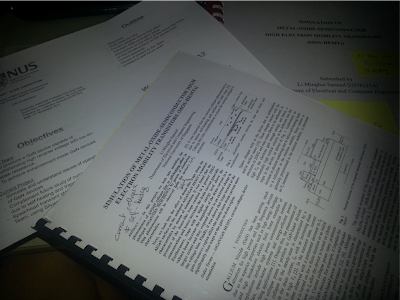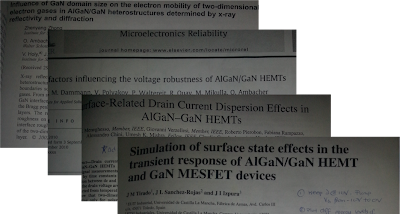Now is about time for NUS final year students (or students in university with similar academic year) to start their Final Year Project, or Thesis. In this post, I will share about the things that I did when I was doing my FYP in 2011. Nothing in this post is unique, I find them to be normal stuff that students should do, but more likely than not, we tend to forget and need some reminders, and hence this post. :)
Choose what you like, or like what you do.
As FYP is a one-year commitment, and it is basically our daily activity, especially for engineering students from NUS (I don't know about other fields), we need to be doing what we like or like what we do, otherwise we will be literally miserable for one full year. We don't always get to do the project we put as first choice, so, it's time to think different and like what you do. Instead of focusing on the topic, why not focus on your supervisor who is there to guide you along? Instead of lamenting that you can't get your first choice, why not focus your energy into learning the selected topic? The only reason why you hate the topic is because you are not comfortable with it. Give it a chance, learn it and I am sure that you will grow 'good feeling' for it.
Focus
As written in one of my previous posts, focus is the keyword no matter what you do, and FYP is no different. In fact, you need more focus in FYP more than any other module. In FYP, there is no one to continuously teach you and there is usually no friend to take the same topic as you. Put it in an extreme way, you are all alone (I will contradict myself in the next section). As you would know from my previous post, I used to spend a lot of time on my FYP, basically all my non-lecture time in the FYP lab and work towards the goals my supervisor and I set for myself, away from all distractions. Is FYP really worth the effort? Definitely yes. My opinion is that knowing the topic well is not the main aim of FYP, instead it is more about self discipline and whether you are independent and mature enough to handle a project by yourself. You will soon find out that you are doing things which you did not think you can, and you are pushing yourself past the boundary which you always thought you are limited to.
Enjoy the process. Take things easy.
To survive the one year, you have to enjoy, otherwise you will be living in hell for a year, which is unhealthy. I remember that I spent about 3 weeks trying to simulate a phenomenon which occurs in HEMT [1], the current collapse. I would stay in the lab and do all I can, read, write code, simulate. However, all the results showed only failures. To make things worse, the time for each simulation ranged from a few minutes to a few hours. I was really upset but I tried to motivate myself. No one in the team had done it, so I would be the first to simulate that. That would be the best achievement.
Do lots of research. Read!
Read for knowledge. In FYP, you need lots of knowledge. For me, I was mainly in research and hence reading was of utmost importance to me. I have read not less than 70 published papers throughout the one year, in addition to some textbooks and manuals. Sounds scary? No worries. I did not fully understand everything. I only read in depth a few papers, the few important ones for my research. The others were merely to have a general knowledge of what is going on and to sift out certain useful important information for my research. Like I have always said, in my own words,
You do not need to know a lot about a lot, you need to know a little about a lot and a lot on one or two important topics.
Hands-on, stop reading.
Hands-on is a must for FYP. More likely than not, you will be required to produce something, either a helicopter, a robot or simulated results. Whatever it is, do it! Reading is for knowledge, but trust me, even if you follow closely the published papers and do what they say, you will not get the same result immediately (at least I did not). You will face another set of new issues once you start to get your hands dirty. And that's where the fun comes in. Start early, fail early, try again!
Ask
Your supervisor is there to help you. Don't feel embarrassed to ask. I was lucky to have a good supervisor in A.Prof Tan Leng Seow from the NUS ECE department. I used to have a one-on-one meeting with him every week, sometimes he requested, at other times me. On top of that, we had a weekly group meeting (with PhD candidates, research students and another supervisor, Dr Yeo Yee Chia, from the NUS ECE department). Through these group meetings, I got to know the smarter and more experienced students and they were very willing to help me whenever I needed help. I consider myself very lucky to be in the group. But first, I must help myself first by opening my mouth to ask. I am very sure that there are people around you who can help you, just look around proactively, just ask around.
Remember this: You may not get what you want, but you never know if you never ask.
Since I am on the topic of FYP, I would like to take this chance to thank the people who have helped me in one way or another again. Prof Tan, Dr Yeo, Mr Edwin Low Kim Fong, Dr Liu Zhihong, Mr Pannirselvam and Mr Liu Xinke. Thank you so much! :D
[1] HEMT: High Electron Mobility Transistor



No comments:
Post a Comment
I welcome any feedback so that I can improve. :)